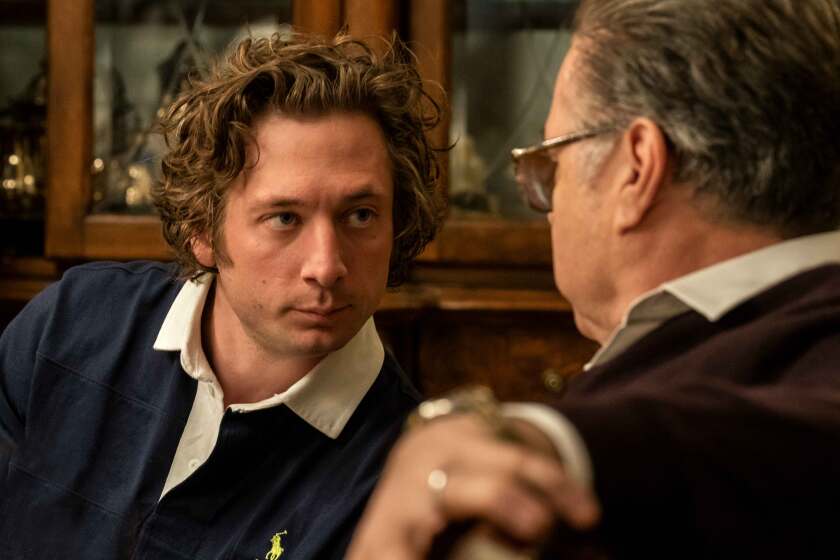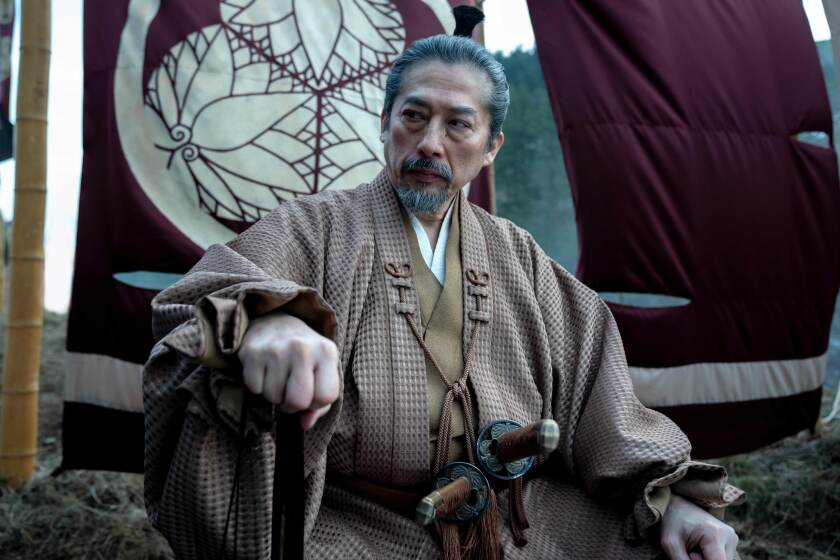Between ‘Shōgun’ and ‘The Bear,’ Emmys defy classification

- Share via
Is a television series really a comedy if you’re in tears at the end of nearly every episode?
Not the “I laughed so hard, I cried” kind of tears, either, but honest-to-god weeping at the emotional heartbreak unfolding before your eyes kind of tears.
Does the answer even matter?
For Emmy voters filling out their ballots last year — for a ceremony that, thanks to the actors’ and writers’ strikes, was delayed to January — the response was a resounding “no.” FX’s “The Bear” swept through the Emmys for its inaugural season, winning 10 prizes, including comedy series, writing and directing and honors for actors Jeremy Allen White, Ayo Edebiri and Ebon Moss-Bachrach.
This for a show that puts its characters in such stressful situations that one of the most common searches related to it is: “Should I watch ‘The Bear’ if I have anxiety?” (Short answer: Yes, chef!)

The day after the ceremony, my inbox was flooded with emails from readers asking a variation of the same question: How in the world is “The Bear” a comedy series?
The explanation, according to the Television Academy, can be boiled down to this: “The Bear” is a comedy because its creator, Christopher Storer, says it is.
“It’s being marketed as a comedy, it has been recognized by other awards shows as a comedy, so we allow it to enter comedy,” Television Academy President and Chief Executive Maury McIntyre tells me. “Now, had it been a dark murder-mystery and someone wanted to call it a comedy, but it was being marketed as a dark murder-mystery, we’d review it. But we’re sticking with this idea of intent on behalf of the creator. And Christopher Storer says he is making a comedy.”
Christopher Storer, the creator of “The Bear,” discusses how he directed the season’s wild and stressful holiday episode, “Fishes.”
That strikes many people as odd, particularly anyone who remembers the emotionally exhausting Season 2 flashback episode in which the family gathers for Thanksgiving dinner that begins with Mikey — the brother whose suicide set the show’s story in motion — reminding his sister Natalie not to ask Mom if she’s OK. And then we spend the next hour learning that Mom, played by Jamie Lee Curtis in a turn that likely will earn her an Emmy to go along with that recent Oscar, is most decidedly not OK and is in fact on the verge of a mental collapse. The episode ends (spoiler alert) with Mom driving her car through a wall and into the living room.
So, yes, there’s once again going to be a little disconnect if the second season of “The Bear,” which was even more intense and draining than the first go-round, barrels through the Emmys’ comedy categories.
But then, what might be an anxiety-inducing pressure cooker to you might be a laugh riot to someone who views “The Sopranos” as essentially a dark comedy. Come to think of it, as heartbreaking as it often was, “Succession” might have been this decade’s funniest series, even though, quite logically, it slotted as a drama at the Emmys. Speaking of which: Rival awards consultants gripe that the only reason “The Bear” went comedy last year was to avoid having to compete against “Succession” for its final season.
“‘The Bear’ is a very good show, and nobody broke any rules,” says one campaigner, not authorized to speak on the record. “But I think they were just looking at the landscape and picking the spot where they thought they could win.”

Which brings us to the curious case of “Shōgun,” FX’s 10-episode adaptation of James Clavell’s 1975 historical novel following a fictionalized 17th century Japanese leader, the cunning and revered Lord Yoshii Toranaga. The show’s final episode ended, as Justin Marks, who created the series with Rachel Kondo, told the Direct in February, “exactly where the book ends.” Marks added, “I think we tell the complete story of the book.”
That full-stop period at the end of the program made it logical to assume that “Shōgun” would be competing as a limited series, just like the 1980 television adaptation of Clavell’s book that starred Richard Chamberlain. This week, the Gotham Film & Media Institute announced its nominees for the inaugural Gotham TV Awards, putting “Shōgun” in limited series alongside “Baby Reindeer,” “Ripley,” “The Sympathizer” and “Under the Bridge.”
FX and Hulu have announced that its acclaimed series “Shogun” has been renewed. The story will continue for “likely” two more seasons.
Yet it would appear that “Shōgun” will be competing at the Emmys in the drama categories, even though FX has not yet officially renewed the series for a second season. (A few hours after this column was published, FX announced “Shōgun” will return for “likely” two more seasons.) Deadline reported Friday that Hiroyuki Sanada, who plays Toranaga, had closed a deal to return. That would suggest that, among other things, the show will continue to follow Toranaga as he becomes shōgun. But at the moment, that’s all we know. And since the first season of “Shōgun” took roughly five years to make, we might not be getting details any time soon.
That’s not the only mystery related to the show. A week after the Emmys’ entry deadline, we still have no confirmation as to where “Shōgun” will compete at this year’s ceremony. Both FX and the Television Academy declined comment. But outside sources believe it’s “very clear” that “Shōgun” is going drama.
Lady Mariko and Ochiba are among “Shōgun’s” women who navigated their social constraints in feudal Japan to live on their own terms.
From a competitive standpoint, the decision makes sense. Thanks to the production delays caused by last year’s strikes as well as the end of Emmy-nominated perennials like “Succession” and “Better Call Saul,” this year’s lineup of drama series contenders is thin, with “The Crown” being the only nominee from last season still eligible.
Meanwhile, limited series boasts the Netflix hit “Baby Reindeer,” the popular new season of “True Detective” and lavish productions like “Masters of the Air” and “Ripley.” FX also has “Fargo” and Ryan Murphy’s “Feud: Capote vs. the Swans” in the category. For the network, moving “Shōgun” would provide breathing room to the shows and their ensembles. Murphy’s long relationship with FX (“Pose,” “American Crime Story” and “American Horror Story”) could also be a motivating factor.
“He’s put a lot of pressure on them to get ‘Shōgun’ out of limited,” says a source with knowledge of the situation.
But, again, we have no official confirmation on the Emmy category. For all we know, FX entered “Shōgun” as a comedy based on Cosmo Jarvis’ epic, hilarious, profane rants as John Blackthorne and Tadanobu Asano’s raucous portrayal of Yabushige. (Probably not.)
The distinctions are becoming increasingly difficult to parse, as anyone who watched the four seasons of Bill Hader’s Emmy-nominated comedy series “Barry” unfold into bleak despair knows.
“It’s a comedy because it’s 30 minutes,” Hader told The Times a couple years back, talking about the category placement of “Barry.” “I always just say I’m doing a story. Because I don’t find it any darker than what the news is, you know?”
And the way things are going on that front, the Emmys would have to add another category to keep up: horror.
More to Read
Sign up for The Envelope
Get exclusive awards season news, in-depth interviews and columnist Glenn Whipp’s must-read analysis straight to your inbox.
You may occasionally receive promotional content from the Los Angeles Times.














